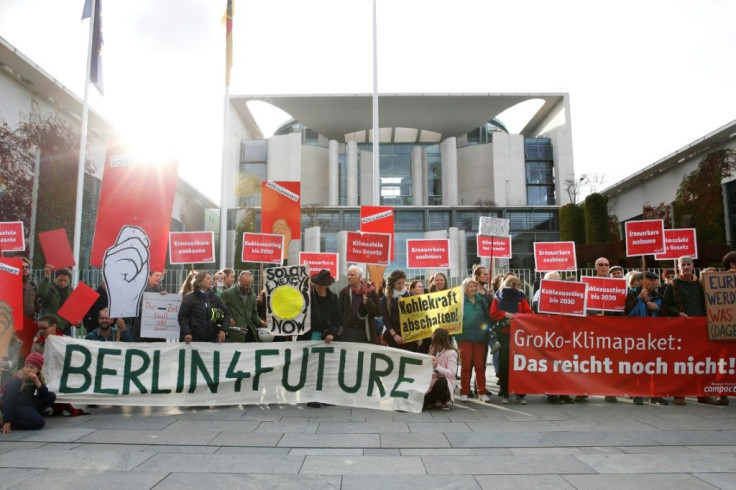Germany Commits 100 Bn Euros For Climate As Protests Heat Up

German Chancellor Angela Merkel announced Friday a sweeping climate protection plan worth at least 100 billion euros by 2030, as hundreds of thousands protested for action against global warming.
Merkel's coalition government, after marathon overnight talks, sealed a deal to tackle emissions in the energy and industrial sectors, boost zero tailpipe emission electric vehicles, and get passengers out of planes and onto trains.
Emission trading will discourage fossil fuel use, 86 billion euros will be ploughed into railway infrastructure, and cities will test 365-euro annual tickets for public transport.
By 2030 "a three-digit billion euro figure will be made available for climate protection and the energy transition," said a summary of the sweeping package.
The government, which has faced international pressure to invest its huge annual budget surpluses, said the extra spending will help to "support the economy" without affecting its plans to keep the budget balanced.
'Unite behind science'
As the politicians emerged red-eyed from their overnight talks, protesters were out in the streets bearing posters with slogans like "make rainforests great again" or "I want a hot date, not a hot planet".
In the biggest global wave to date of the Fridays for Future climate strikes started by Swedish teen Greta Thunberg, protest action was held in 575 sites across Germany.
Vice Chancellor Olaf Scholz admitted at a press conference that "Friday for Futures jolted us into action".
Merkel too noted that "if there is something that impressed me, then I have to say as a scientist that it is when Greta Thunberg said 'unite behind the science'."
Environmental groups, however, ripped into the climate plan.
"What we have today is not a breakthrough, but a scandal," wrote Luisa Neubauer, a key figure in the school strike movement.
The co-leader of the Greens, Annalena Baerbock, also slammed the plan as "slow, lax and non-binding".
But SPD leader Malu Dreyer defended what she called a comprehensive package that ramps up investments in green infrastructure while helping the less well-off cope with the transition.
"It is important for us to meet climate targets, but it is also important that we stick together as a society."
Rising stakes
After two blistering summers and weekly school strikes, climate has shot to the top of the political agenda in the EU's biggest economy.
For Merkel's coalition government, the stakes are also rising.
With the economy already projected to slide into recession in the third quarter, balancing the interests of its crucial export industries while not alienating young voters with their green demands has proved to be a tough balancing act.
Germany is set to miss its climate targets for next year but has committed itself to meeting the 2030 goal of a 55-percent cut in greenhouse gas emissions from 1990 levels.
The export powerhouse accounts for around two percent of the worldwide emissions blamed for heating the Earth's atmosphere, melting ice caps, rising sea levels and intensifying violent weather events.
'Life-destroying crisis'
Merkel was once known as the "climate chancellor" as she pushed forward a green energy transition that vastly increased clean renewables such as wind and solar power.
However, many of those gains have been eroded by an increased reliance on dirty coal, in part to offset the phase-out by 2022 of nuclear power that Merkel decided after Japan's 2011 Fukushima disaster.
Her government this year announced a coal phase-out by 2038, but faces local opposition from mining regions, especially in the ex-communist east, where the far-right AfD party has capitalised on fears over job losses.
Car-mad Germany has also lagged badly behind in the transport sector, where state-coddled auto giants VW, Daimler and BMW have long focused on gas-guzzling SUVs more than hybrid or zero-emission electric cars.
Mindful of the 800,000 jobs tied to the auto sector, Merkel's government is cautious that new environment taxes could set off the type of "yellow-vest" protests that have plagued neighbouring France.
"We are heading for a life-destroying crisis and so far nothing has happened," said Linus Steinmetz of the student movement.
"That's why we're raising the pressure."
© Copyright AFP 2024. All rights reserved.











